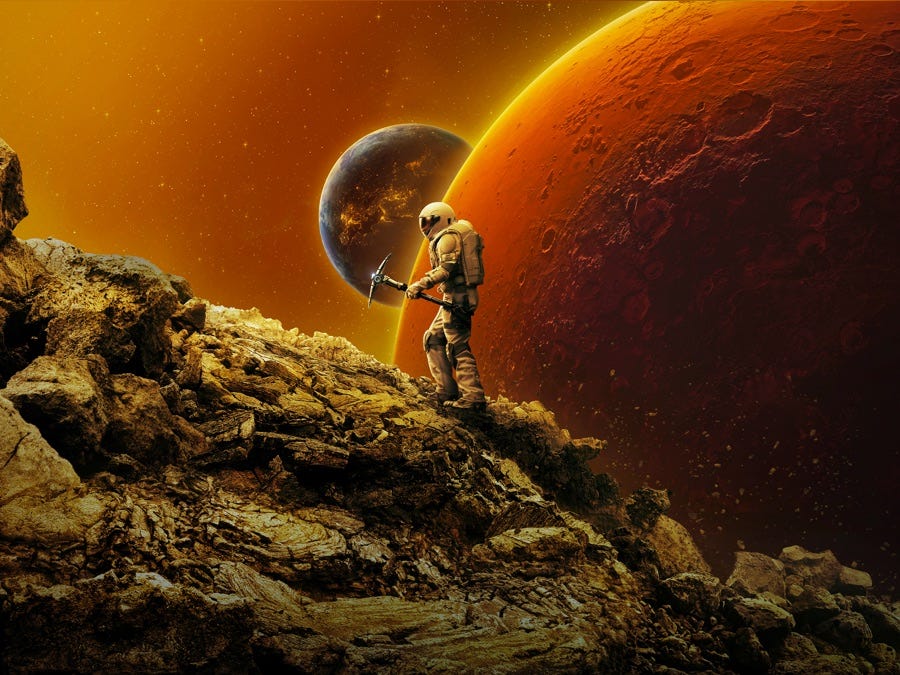🚀⤴ 'For All Mankind' is still the pro-progress, Up Wing show Hollywood and America needs
Guess what? Optimistic science fiction can be full of drama and thrills! Premium TV at its best.
Quote of the Issue
“But the truth is the world is not as simple as we want it to be. It can't just be boiled down into an equation — especially when it comes to human beings. We are flawed, unpredictable, and full of contradictions. It's taken me most of my life to realize it's exactly these traits that make us so resilient, that give credence to the improbable idea that anything is possible, even in the darkest of times. … Our feelings may not be convenient. They may even slow our progress. But they are also the only way to truly begin to understand the world around us. And the new worlds that await us.” - “Margo Madison,” For All Makind, S4:E10, Perestroika
The Conservative Futurist: How To Create the Sci-Fi World We Were Promised
“With groundbreaking ideas and sharp analysis, Pethokoukis provides a detailed roadmap to a fantastic future filled with incredible progress and prosperity that is both optimistic and realistic.”
The Essay
🚀⤴ 'For All Mankind' is still the pro-progress, Up Wing show Hollywood and America needs
The fourth season of For All Mankind on Apple TV+ just concluded. (Warning: There will be spoilers about the entire series.) Good news: I remain astounded at how reliably and persuasively the excellent alt-history show about a never-ending Space Race presents pro-progress, Up Wing themes of the sort found in my new book, The Conservative Futurist. I mean, the main plot driver concerns capturing and mining an asteroid (President Al Gore controversially takes credit for the idea) with plenty of geopolitical intrigue on Earth and on Mars. What more could I ask for than a sci-fi heist storyline with the goal of creating a sustainable Mars colony?
If you have yet to watch FAM, the key point of divergence from our history involves Sergei Korolev, the father of the Soviet Union’s space program, who never regained consciousness after a January 1966 surgery. (The details are actually a bit sketchy, still.) But in creator Ronald D. Moore’s FAM-verse, Korolev survives. As a result, the Soviets beat the United States to the Moon. On Jan. 28, 1969, cosmonaut Alexei Leonov becomes the first human to land on the Moon, uttering the famous words, “I take this step for my country, for my people, and for the Marxist-Leninist way of life, knowing that today is but one small step on a journey that will take us all to the stars.”
Just a month later, Apollo 11 arrives, too, but it's a bumpy landing. At first, NASA thinks Buzz Aldrin and Neil Armstrong are dead, as does Michael Collins who refuses to return to Earth without his comrades. But finally Mission Control in Houston receives a crackly message from Armstrong on the lunar surface:
Tranquility Base here. … Do you read? Just wanted to let you know that the Eagle has landed. She might have clipped a feather or two on the way down, but she's still here, and so are we. … Not one of my better landings. But like we used to say in the navy, any landing that you can walk away from is a good one. We had a rough start, but we've decided to pick ourselves up and get back to work.
And so the Space Race continues with the Americans and Soviets competing to hit various Moon milestones and eventually be the first to Mars. Each season of FAM takes place a decade later than when the previous one ends, with the just-completed season beginning in 2002. Each season also concludes with a flash-forward stinger such as a sea-launched Sea Dragon rocket headed to the Moon in 1983, an astronaut (or cosmonaut) striding forth on the Martian surface in 1995, and a sophisticated asteroid-mining operation in 2012.
Keep humanity moving foward
Throughout, the ethos contained in the words of FAM’s Neil Armstrong provides a narrative and thematic throughline: Mistakes will be made and disasters will happen, but we’ll learn our lessons and keep pushing humanity forward. We’ll pick ourselves up and get back to work.
At the end of the first season, in an episode titled “A City Upon a Hill,” astronaut Ellen Wilson is asked by a reporter if humanity’s space adventure is worth the sacrifice (although what the reporter is really asking is if it’s ever worth the effort to see what’s around the river bend or over the next hill) and gives this reply:
I mean, it's dangerous. Lives have been lost, and, honestly, probably more will be lost. But every one of us knew the risks before we joined, the toll it takes on us — and on the ones we love. But we all signed up just the same. It's the price we pay to push forward, to explore the universe and wander into the unknown. Pushing ourselves to the limits of what's possible. Are there sacrifices that have to be made? Of course. But sacrifice is a part of any journey. It's like those caravans, the wagon trains that crossed our country a hundred years ago in search of a new home. Or the ships that sailed across the Atlantic in search of a new world. Taking on these great challenges against great odds — that's what makes us human. Remember, we chose to go to the Moon not because it was easy, but because it was hard. So, yes. Yes, I think it's worth it. Because no matter how hard it is now, when we look to the future, we can see that things can... they can get better. I do believe that.
That’s Up Wing, my friends, the notion that our world will get better — indeed, the only way it can get better — if humanity takes risks, makes sacrifices, accepts the reality of trade-offs, and endures the inevitable hardships and loss. Sometimes “you need to roll the hard six,” in the words of Admiral Adama from another Moore show, Battlestar Galactica. To never take a risk is the biggest and dumbest risk of all.
The world we didn’t get
On the other hand, taking ambitious-but-smart risks as you keep an eye on the frontier of possibilities … well, doing that might just produce some pretty phenomenal results. In the FAM timeline:
NASA establishes a moon base in 1973;
The Three Mile Island nuclear reactor avoids a meltdown in 1979 thanks to NASA tech;
The Space Shuttle travels to the moon in 1982;
Electric cars become commercially available in 1983, also thanks to NASA tech;
The World Wide Web emerges in 1985;
A space tourism company is founded in 1986;
Helios Aerospace wins a NASA contract to mine lunar deposits of Helium-3 in 1987;
Humanity's shift from fossil fuels to nuclear fusion ends the threat of global warming in 1989;
The US, USSR, and Helios launch missions to Mars in 1994;
Helios Mars base and Happy Valley Base are established on Mars in 1995 — and much more!
Beyond a broad Up Wing flavor, FAM also illustrates some specific Up Wing traits and themes as laid out in The Conservative Futurist, some of which are rarely seen in high-end television and films. Among them:
Entrepreneurial capitalism can be a force for good. Helios is FAM’s Elon Muskian tech conglomerate that plays a key role in the series. Like the real-world boss of SpaceX (and many tech entrepreneurs), CEO Dev Ayesa is a difficult and at times ruthless person. But he also passionately dreams of the Red Planet and his company helps get humanity there. (It also develops the first commercial nuclear fusion reactor.) And if he has to break a few rules along the way, so be it.
A dynamic, growing society that can imagine a better future is a more accepting one. A common criticism of Project Apollo in the real world — one that continues to be launched at space exploration — is that rather than looking to the stars, we should focus on earthly issues. Yet in the boomy 1960s, with the Atomic and Space Ages in full gear, the same America that was sending men to the Moon was also tackling deep poverty in a way it had never done before, while also advancing civil rights. (Likewise, the Great Recession and Not-So-Great Recovery in the 2010s likely contributed to the rise in populism.) In the FAM-verse, the heroic example of women astronauts leads to passage of the Equal Rights Amendment in 1974, while same-sex marriage is legalized in 1998 by now-Republican President Ellen Wilson, who comes out as gay in her first term and wind re-election with running mate George H.W. Bush.
Technology can solve big problems. Not only does nuclear fusion end the debate over climate change in FAM, but the ability to capture and mine an asteroid made of iridium, a valuable but rare element here on Earth, is described by FAM thusly in the latest seasons: “If it is able to be harnessed and its iridium mined in Mars orbit, economists predict it will lead to another technological revolution here on Earth.” Indeed, several FAM characters treat the possibility as potentially changing humanity’s destiny as a spacefaring civilization for the better. That’s not your typical Hollywood message.
We’re all in this together, and a shared sense of human purpose is helpful. In the second season finale, “The Grey,” US-Soviet conflict over the Moon — including a Soviet blockade of a NASA resupply mission — threatens to start World War III. But President Ronald Reagan, first elected in 1976 in the FAM-verse, settles the issue in Moscow with Soviet President Yuri Andropov and deescalates the conflict. Despite the brewing hostilities, NASA and its Soviet counterpart still go through the Apollo-Soyuz mission where spacecraft from each country link up and an astronaut and cosmonaut shake hands in orbit. As FAM’s new channel reported: “Sources at the White House conveyed that President Reagan, like millions around the world, was so moved by the images of the Apollo-Soyuz mission that it inspired him to reach out his own hand in peace." Or as a cosmonaut says in the season one finale: “We are on the dark ocean together. We have no choice but to trust each other.” (Well, trust but verify.)
I can’t wait for a fifth season of For All Mankind, although it has yet to be confirmed by Apple TV+. My only note: A bit more world-building, please, especially regarding the impact of tech progress and a long economic boom on everyday life, as well as US politics. (The show has probably taken a deeper dive into the impact on the Soviet economy than on America’s.) I would be happy to consult!







Great article James. I also wrote a piece on my Substack and mentioned your work. You can check here:
Beyond the Moon: 'For All Mankind' and the Dawn of Terra 2.0.
Explore how 'For All Mankind' encapsulates our Terra 2.0 vision, fostering techno-optimism for a progressive, interconnected future.
https://frankdasilva.substack.com/p/beyond-the-moon-for-all-mankind
It was great, but it fell apart this season. The finale was esp galling. Dev's strategy is to steal a natural resource? That's not upwing--that's old school predation. And how would it work, anyway? Earth could just starve out everyone on the base (and why would they let him get away with it?). Goldilox has no value for Mars other than trading it with Earth, and they just prevented Earth from becoming far more prosperous and developed.